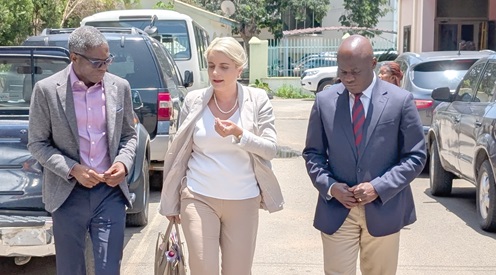The Inter-Ministerial Coordinating Committee (IMCC) on Decentralisation Secretariat convened the maiden meeting of the Decentralisation Sector Working Group (DSWG) since the inception of the new government.
The meeting brought together key representatives of the Government of Ghana (GoG) and Development Partners in a spirit of collaboration and a shared commitment to advancing Ghana’s decentralisation agenda.
In his opening remarks, the Executive Secretary of the IMCC on Decentralisation, Dr Gameli Kewuribe Hoedoafia, thanked members for their participation.
He said the high-level dialogue underscores the government’s dedication to deepening local governance, and ensuring that decentralisation remains a key pillar of Ghana’s development agenda.
Dr Hoedoafia stressed that the DSWG is a high-level platform which enhances policy coordination, prevents duplication of efforts and provides the space for policy dialogue between the government of Ghana and Development Partners to accelerate decentralisation reforms, ensure resource efficiency and promote effective delivery of services at the local level.
He emphasised the critical role of Development Partners in supporting Ghana’s vision for an efficient, transparent, and inclusive decentralisation and local governance process.
The meeting, which was held at the conference room of the Ministry of Local Government, Chieftaincy and Religious Affairs, was chaired by the sector Minister, Ahmed Ibrahim.
Reforms
Mr Ibrahim reaffirmed government's commitment and dedication to decentralisation under the Reset Agenda.
He said the 2024 electoral victory signified strong public endorsement of those reforms, adding that the primary focus of the government’s decentralisation agenda was the election of Metropolitan, Municipal and District Chief Executives (MMDCEs) on a non-partisan basis.
This, he said, was in response to the long-highlighted concern by civil society organisations and other stakeholders about the undemocratic nature of the current appointment system.
Mr Ibrahim, who is also the National Democratic Congress Member of Parliament (MP) for Banda in the Bono Region outlined several key priorities aimed at strengthening local governance.
Mr Ibrahim called for strong collaboration with Development Partners to effectively implement these initiatives, ensuring sustainable decentralisation and improved governance across the country.
Effective system
The Co-Chair of the DSWG, Ambassador Simone Giger, the Swiss Ambassador to Ghana, Togo and Benin, emphasised the importance of decentralisation and local governance in Ghana.
Drawing from personal experiences with decentralised governance in Switzerland, she stressed that an effective decentralisation system enhanced responsiveness and accountability, particularly in a diverse nation such as Ghana.
She expressed satisfaction with the government’s commitment to decentralisation, saying there were ongoing engagements and Switzerland’s support for Decentralisation and the Constitution Review Committee.
Present at the meeting were the Attorney-General and Minister of Justice, Dominic Akuritinga Ayine, and the Minister of Gender, Children and Social Protection, Agnes Naa Momo Lartey.

